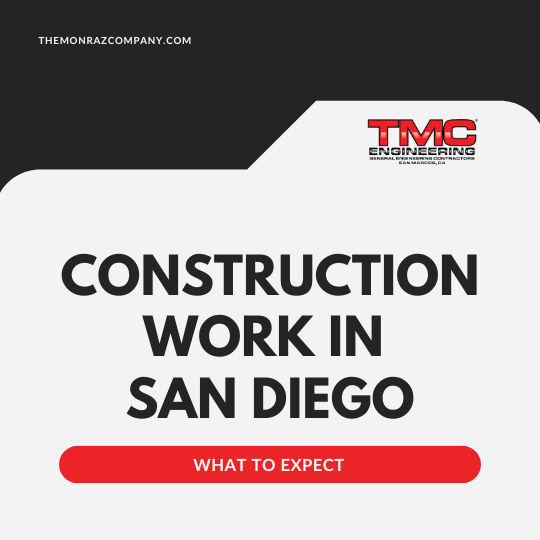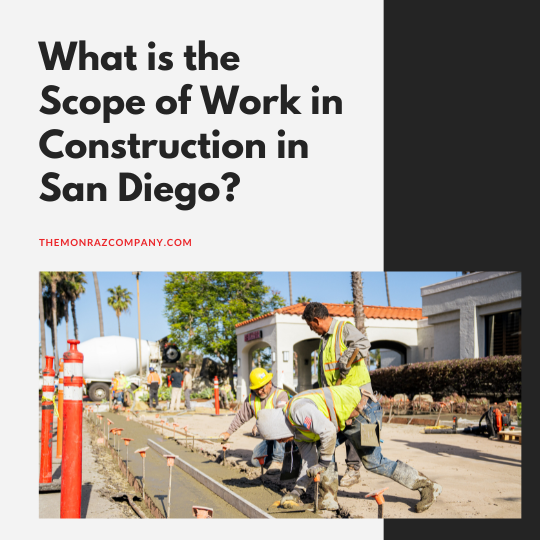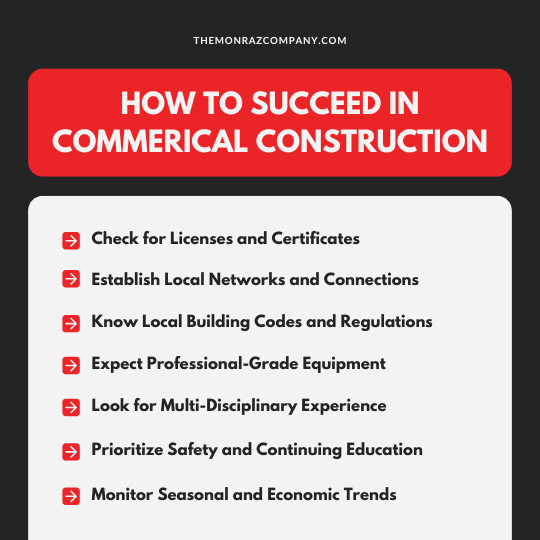Construction Work in San Diego: What to Expect
San Diego is one of the most dynamic metropolitan cities in California, with a record growth in its building activity. The city's strategic location, agreeable climate, and robust economy have driven construction growth in various areas. From downtown high-rise developments to beachside complexes, San Diego's building activity presents an excellent opportunity for companies and professionals alike.
Because of all the recent growth in San Diego’s construction industry, knowing the local environment is vital for success. This guide covers key considerations, legal requirements, and essential strategies for businesses planning commercial construction projects.
If you’d like a quicker or more specific answer to your repairs and construction questions, call the experts at
TMC Engineering! If you’re in Southern California, we can help educate you on your problem and perform whatever repair is necessary. We’ve got an expert solution for your concrete or asphalt concern!

Construction Work in San Diego: What to Expect
San Diego's construction industry has undergone significant transformation in recent years. From large-scale infrastructure and commercial development projects to residential expansion, the city is growing and changing each day. Because of this growth, the demand for skilled construction workers continues to expand in several construction trades.
You will find that San Diego's construction industry offers a wide and versatile range of opportunities. The city’s proximity to Mexico, for example, creates one-of-a-kind cross-border construction projects. Additionally, its status as home to the country’s largest naval base drives demand through major government contracts. Furthermore, the thriving tourism industry drives the construction of restaurants, hotels, and entertainment complexes.
This article will provide helpful information about how to successfully navigate San Diego's commercial construction industry. You'll learn about construction project requirements, localized building codes, and what to expect when planning or managing a commercial build. In addition to this, we’ll discuss the typical scope of work in San Diego construction and share helpful tips for planning a successful project.

What is the Scope of Work in Construction in San Diego?
Understanding construction in San Diego requires knowledge of the city’s unique regulations and project-specific conditions. Both of these aspects significantly influence the progress of building projects throughout the entire state.
Commercial Construction Projects
San Diego’s commercial buildings consist of office space, retail buildings, warehouses, and mixed-use developments. These tend to be highly integrated between multiple construction trades and strongly code-compliant with California commercial building regulations.
The scope generally entails preparing the construction sites, laying the foundation, framing the structure, and installing mechanical systems. Furthermore, commercial projects must meet the
Americans with Disabilities Act and
California Title 24 Energy provisions. Project specifications generally include seismic considerations due to the area’s seismicity.
Related: California Construction Code: Practices and Policies
Infrastructure and Civil Engineering Projects
Due to San Diego’s growing infrastructure, civil engineering projects are increasing throughout the entire metropolitan area. These projects consist of things such as constructing roads, repairing bridges, upgrading water treatment facilities, and improving overall transit.
These infrastructure projects involve specialized equipment and heavy machinery alongside experienced construction managers well-acquainted with California's environmental regulations. Additionally, these projects often entail coordination between a variety of government agencies and adherence to prevailing wage laws.
Residential Construction Developments
Residential construction remains a significant sector of San Diego's construction business. However, residential construction is not only single-family homes but also condominiums, apartment buildings, and retirement communities.
Residential projects are subject to California's strict energy efficiency requirements and fire safety regulations. Furthermore, many residential developments incorporate sustainable construction and renewable energy systems, aligning with California’s emphasis on environmental sustainability.
Specialty Construction Sectors
San Diego's unique geography and economy create opportunities for specialty construction markets. Marine construction maintains the city's naval facilities and commercial ports, while healthcare construction supports the medical facilities and research structures that are growing throughout the region.
Specialty markets demand special skills and often involve complex project specifications. Marine construction, for instance, requires knowledge of coastal regulations and the use of cutting-edge building materials and equipment for saltwater applications. Healthcare construction, on the other hand, involves a strong understanding of things such as infection control protocols and accessibility guidelines.

How to Succeed in Commercial Construction
San Diego’s construction industry requires an understanding of local trends and the importance of relationship-building in the region. California's construction industry is governed differently than the rest of the states, so knowing local expertise is critical.
Check for Licenses and Certificates
California has special licensing requirements for most building trades, and San Diego enforces it strictly. When planning commercial construction of any kind, it’s crucial to work with contractors that hold valid licenses and certifications.
The majority of construction licensing falls under the jurisdiction of the
California Contractors State License Board. However, specific trades may require additional certifications. Electrical work, for example, typically requires both a state license and a local permit for most construction jobs. Similarly, plumbing and HVAC work require special certifications in this sector as well.
Additionally,
Occupational Safety and Health Administration (OSHA) certifications are required for many construction projects. These safety certifications not only ensure legal compliance but also give you confidence in training, professionalism, and ability to navigate complex situations.
Establish Local Networks and Connections
Networking in San Diego's construction industry is essential. Contractors with strong networks can often navigate permitting and project timelines more efficiently. This includes ties to trade associations, building inspectors, and permitting agencies, (including lenders for future construction loans).
The Associated General Contractors of San Diego Chapter offers excellent opportunities and valuable resources for construction professionals. Similarly, specialty trade organizations offer contacts in particular building trades.
Look for companies affiliated with the right networks. These groups not only foster higher standards, but also lead to construction opportunities as businesses grow and/or renovate.
Know Local Building Codes and Regulations
San Diego building codes incorporate California state code requirements, as well as local regulations tailored to the city’s unique specifications. Get acquainted with seismic design standards, coastal zone codes, and energy efficiency standards.
The city's
Department of Development Services also provides information on learning about local building codes and permit requirements. Additionally, staying up to date with code changes ensures the commercial work completed will comply with all regulatory standards.
Environmental legislation has a profound influence on California building projects. Understanding these needs enables you to anticipate project issues and implement appropriate measures. To learn more about
San Diego construction permits, read here.
Expect Professional-Grade Equipment
San Diego's competitive building sector demands high-quality work, which in turn requires quality equipment and tools. It's important to require and expect professional tools capable of withstanding the demands of commercial building projects. For more on this, check out our post, “Tools for Concrete: Essential Equipment for Concrete Projects.”
When considering equipment, determine which types of commercial construction work you're most interested in. For example, seismic retrofitting, particularly in coastal environments, requires specialized, corrosion-resistant equipment. Construction workers who come readily available with these tools are more likely to succeed in any job they're given.
Look for Multi-Disciplinary Experience
The most efficient commercial builds are managed by teams with multi-disciplinary experience. This, in turn, results in a smoother collaboration and overall process between crew members. It also contributes to fewer scheduling conflicts and better problem-solving on the job sites.
For example, a builder who understands both framing and drywall can fluently change between activities as project needs change. When evaluating contractors, ensure that they come equipped with a substantial amount of knowledge to properly assist in commercial structures.
Prioritize Safety and Continuing Education
California's emphasis on occupational health and safety holds all contractors to high-safety standards. Contractors should provide ongoing safety training and demonstrate clear protocols for job site risk management and incident response.
Employees who demonstrate consistent commitment to ongoing education are highly-valued and irreplaceable. Training opportunities offered by trade schools, labor unions, and professional associations can be highly affective in the commercial construction business.
Construction project management skills also become increasingly valuable. Expertise in scheduling, budgeting, and quality assurance can pave the way to both individual and team success.
Monitor Seasonal and Economic Trends
San Diego's building construction industry is seasonal, with work availability and project types fluctuating accordingly. These factors may affect project costs, permitting timelines, and material available.
Local economic conditions, major development projects, and government policies also influence California's construction activity. Stay informed about local economic conditions, major development projects, and government policies that impact the construction industry.
Building relationships with contractors and possessing diverse skills equips you to weather both economic and seasonal downturns in building activity.
Success in San Diego's construction industry requires technical skills and an understanding of the local business environment.
San Diego's continued growth, combined with California's emphasis on safety and quality, positions it as a market that respects experienced construction practitioners and innovative businesses.
Success involves familiarity with local building codes, industry contacts, and proficiency in multiple building trades. Furthermore, staying current with technology and environmental issues positions you for long-term success in this continually evolving field.
Here at
TMC Engineering, we have a deep commitment to delivering projects characterized by the highest
standards for safety, workmanship, and client satisfaction. We aim to provide you with valuable content and insights related to the
services our
team of experts provides! Whether you require
asphalt paving,
striping, sealing, or
concrete work, we offer a full suite of transportation construction solutions. Look no further; we’ve got all you need and more!
Contact us today to discuss your needs and receive a customized proposal. We’re committed to building lasting partnerships by delivering quality-driven solutions.




